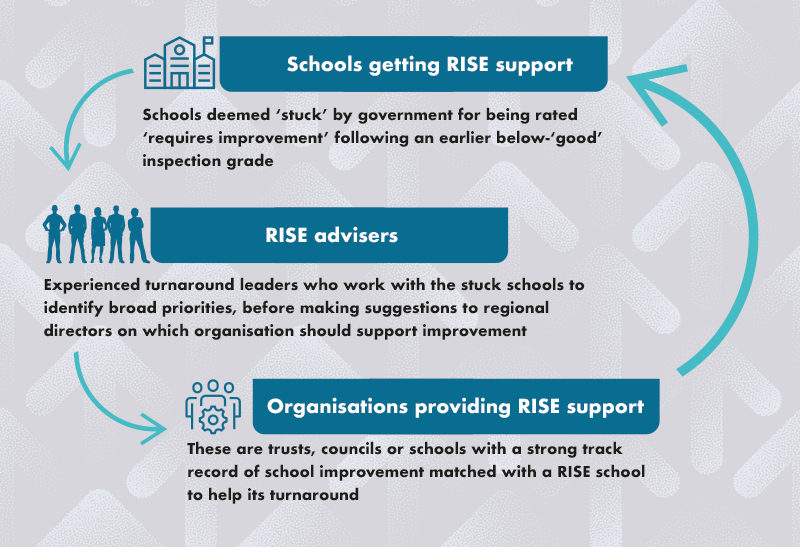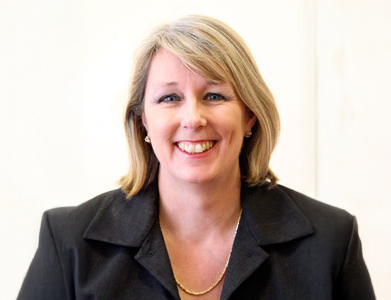The government must be more transparent about how decisions about its RISE teams are made, leaders have said, after it emerged many advisers buy in support from their colleagues’ organisations.
In a fifth of schools supported under the government’s RISE scheme, advisers brokered help from organisations employing fellow advisers, a Schools Week investigation found.
Many worked in the same regions.
One trust chief executive, who did not want to be named, said it “gives the perception of jobs for the boys”.
But the government said it had a “clear conflict of interest policy” to “uphold integrity of the programme”.
Many advisers had also been “seconded from trusts that have a strong track record of school improvement, and we have drawn on this expertise within the system to support RISE schools”.

But the government does not currently publish details about how decisions are made.
Sam Henson, the deputy chief executive of the National Governance Association, added: “While peer support can be valuable, this does open the programme up to questions about potential conflicts of interest that need careful management through robust accountability frameworks, clear impartiality safeguards and ongoing transparency.”
Our analysis also found organisations providing RISE support have their own “stuck” schools.
And several trusts with more than one RISE school receive support from different organisations, leading to concerns improvements will be difficult to maintain once support ends.
The RISE school advisers appointing their own
Data obtained through the freedom of information act shows 167 stuck schools, added to the RISE programme before the summer break, have so far been given targeted support.
Stuck schools are those rated ‘requires improvement’ following an earlier inspection that resulted in a grade below ‘good’.
The government has seconded 65 experienced turnaround school leaders as advisers who are appointed to specific RISE schools in their region to identify priorities and propose an outside organisation to deliver the support.
The regional director then makes a final decision, with up to £100,000 funding available for each school.
Schools Week analysis found that of the 167 schools, 34 (20 per cent) are receiving support from an organisation employing another RISE adviser.
For 15 of these schools, the advisers work in the same region.
‘Clear boundaries’
Greenshaw Learning Trust, which has a RISE adviser, supports five schools.
William Smith, its chief executive, said there were “clear boundaries … for the different aspects of our involvement” with RISE to ensure there were no conflicts of interest.
Chiltern Learning Trust, which also employs an adviser, is also working with four schools. Adrian Rogers, its chief executive, said decisions over how to match schools were made jointly “by the trust/school and the DfE” and are “not within the gift of the RISE adviser to make” themselves.
“[They] are generally from the stronger trusts, stronger schools and stronger local authorities. Therefore, those organisations will be the ones supporting.”

But Mark Lehain, a former Department for Education special adviser who now leads a trust, said the findings “illustrate the complexity inherent in the new [improvement] model”.
“There’s nothing necessarily wrong with the overlap of relationships, but it could lead to people wondering how and why certain decisions were made.”

A trust CEO, who did not want to be named, added the “absence of transparency makes it worse.
“The key thing is it could be perceived to be a conflict of interest … [and] it gives the perception of jobs for the boys.
“Our sector is too mature for these types of things to happen in these days and ages.”
The DfE said it had a “clear policy requiring all RISE advisers to declare any potential conflicts”.
To “uphold the integrity of the programme”, schools “are not matched with any organisation where a declared conflict exists”.
Supporting organisations “must have a strong track record of school improvement, deliver high-quality and inclusive education and be well-matched to the specific context and challenges” of the RISE school.
The RISE school givers and takers
Our analysis also suggests that seven stuck schools receiving support are run by either a council or trust that employed or recently employed a RISE adviser.
And five of the organisations called in to help RISE schools also have their own stuck schools.
Richard Sheriff, the chief executive of Red Kite Learning Trust, said this could lead to the credibility of supporting organisations being “called into question”.
But he added “many, many trusts” worked in “significantly disadvantaged communities” – which meant they “always have one school that’s got an issue”.
Sapientia Education Trust, whose chief executive Jonathan Taylor is a RISE adviser, has been selected to support a Norfolk primary. Its City Academy Norwich has itself been designated a stuck school and is receiving RISE support.
But Emma Davies, the trust’s director of education, said it was “inevitable that some trusts working with a clear moral purpose and open to taking on schools facing challenge may have some schools that fall within the scope of RISE, whilst also having the strength and expertise to support other schools.
“Strong MATs may well have schools in different stages of their school improvement journey and RISE’s individualised approach is a key strength and welcomed improvement of previous initiatives.”
However, Lehain said the wider findings highlighted the “advantages of the previous model for school improvement, which placed accountability for this solely with the responsible body – the trust for academies and the [council] for maintained schools.
“If a school given RISE support doesn’t get better, it’s no longer clear who is responsible.”
The RISE schools with different masters
In all, 25 responsible bodies – trusts or councils – have more than one RISE school. Twelve of those are working with more than one supporting organisation.
The DfE said in some cases, “one supporting organisation is best placed to support the schools”, while on other occasions “we will draw on the strengths of different organisations for different schools”.

However, Anne Dellar, an education adviser and former chief executive, said this could leave trusts with schools “doing different things”, hindering them from continuing to improve once they left RISE.
She urged the teams to adopt a “coordinated approach”.
The Thinking Schools Academy Trust has seen both of its RISE schools matched with different MATs.
Stuart Gardner, its chief executive, said “much more clarity is needed. The programme requires transparent accountability and a more joined-up approach for trusts with multiple schools in order to really transform provision.”
The trust was “working closely” with the DfE to “share our experiences and feedback so the programme can continue to evolve and deliver on its intended purpose”.
The RISE schools NOT getting support
Our analysis also shows that 31 of the RISE schools have not been matched with a supporting organisation.
The DfE said advisers assessed whether the schools had “the resources and expertise to deliver the improvements they’ve planned”. Following this, it was decided they did not need the additional input from a supporting organisation.
However, it is understood regular progress meetings are held.

Loic Menzies, an associate fellow at the Institute for Public Policy Research, said the findings suggested “schools are working with their RISE teams to put together packages of support that are tailored to their context and needs – rather than a one-size-fits-all”.
But he warned: “This diversity comes with the risk of inconsistent quality and will therefore need careful monitoring.
“We all know that there is a huge amount of expertise within the education system and hopefully, as RISE teams get into their stride, they will be able to play a valuable role in getting that expertise to where it can have maximum impact.”
Last month the department also confirmed RISE powers will be expanded, with a consultation set to be launched in the autumn.
A DfE spokesperson said RISE teams were “providing the catalyst needed to drive up standards in all corners of the country”.
















Your thoughts